Mises, Ludwig von. Human Action: A Treatise on Economics
Подождите немного. Документ загружается.

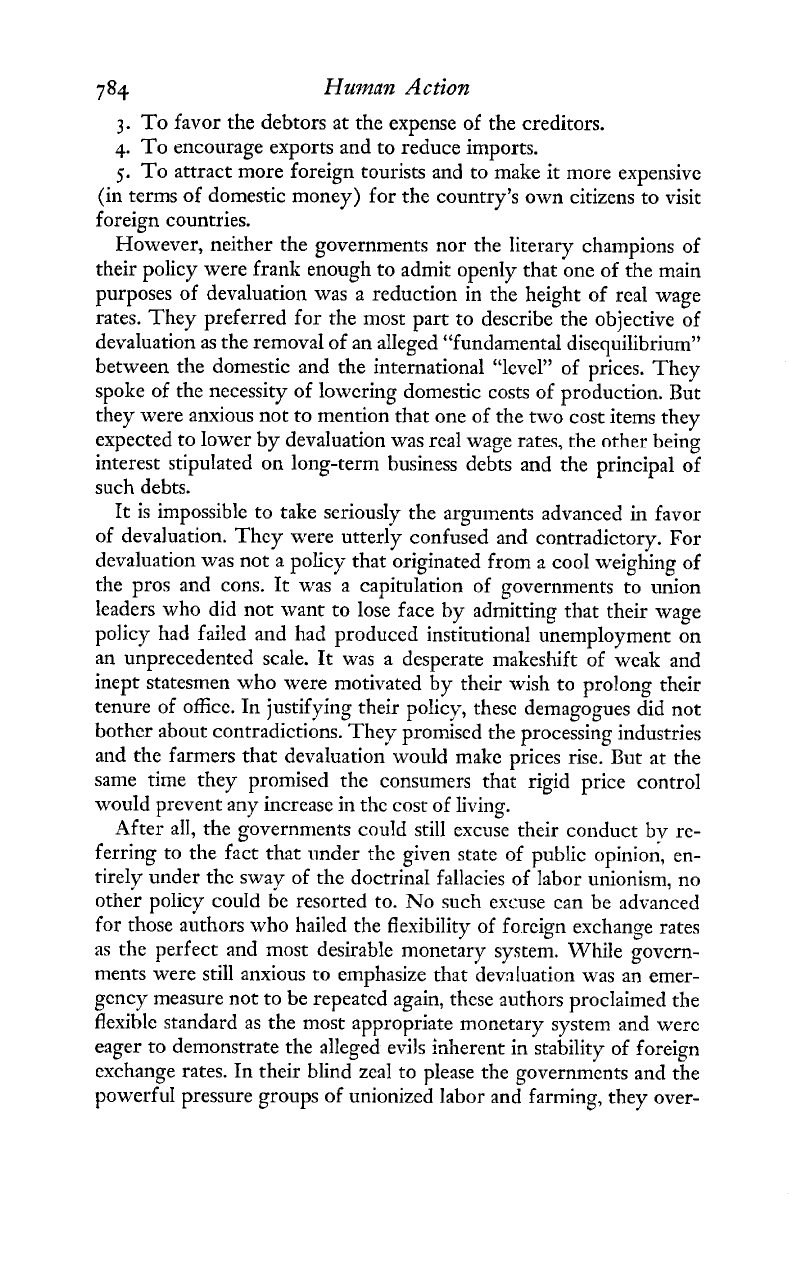
7
84
Human
Action
3.
To favor the debtors at the expense of the creditors.
4.
To encourage exports and to reduce imports.
5.
To attract more foreign tourists and to make it more expensive
(in tcrms of domestic money) for the country's own citizens to visit
foreign countries.
However, neither the governn~ents nor the literary champions of
their policy were frank enough to admit openly that one of the main
purposes of devaluation was a reduction in the height of real wage
rates. They preferred for the most part to describe the objective of
devaluation as the removal of an alleged "fundamental disequilibrium"
between the domestic and the international "levcl" of prices. They
spoke of the necessity of lowcring domestic costs of production. But
they were anxious nor to mention that one of the two cost items they
expected to lower by devaluation was real wage rates, the other being
interest stipulated on long-term business debts and the principal of
such debts.
It is impossible to take seriously the arguments advanced in favor
of devaluation. Thcy were utterfy confused and contradictory. For
devaluation was not a policy that originated from a cool weighing of
the pros and cons.
It
was a capitulation of governments to union
leaders who did not want to lose face by admitting that their wage
policy had failed and had produced institutional unemployment on
an unprecedented scale. It was a desperate makeshift of weak and
inept statesmen who were motivated by their wish to prolong their
tenure of office. In justifying their policy, these demagogues did not
bothcr about contradictions. They promised the processing industries
and the farmers that devaluation would make prices rise. But at the
same time they promised the consumers that rigid price control
would prevent any increasc in the cost of living.
After all, the governments could still excuse their conduct bv re-
ferring to the fact that under the given state of public opinion, en-
tirely under the sway of the doctrinal fallacies of labor unionism, no
other policy couid be resorted to. No such excuse can be advanced
for those authors who hailed the flexibility of foreign exchange rates
as the perfect and most desirable monetary system. While govern-
ments were still anxious
to
emphasize that devnluation was an emer-
gency measure not to be repeated again, these authors proclaimed the
flexible standard as the most appropriate monetary system and werc
eager to demonstrate the alleged evils inherent in stability of foreign
exchange rates. In their blind zeal to please the governments and the
powerfuI pressure groups of unionized labor and farming, they over-
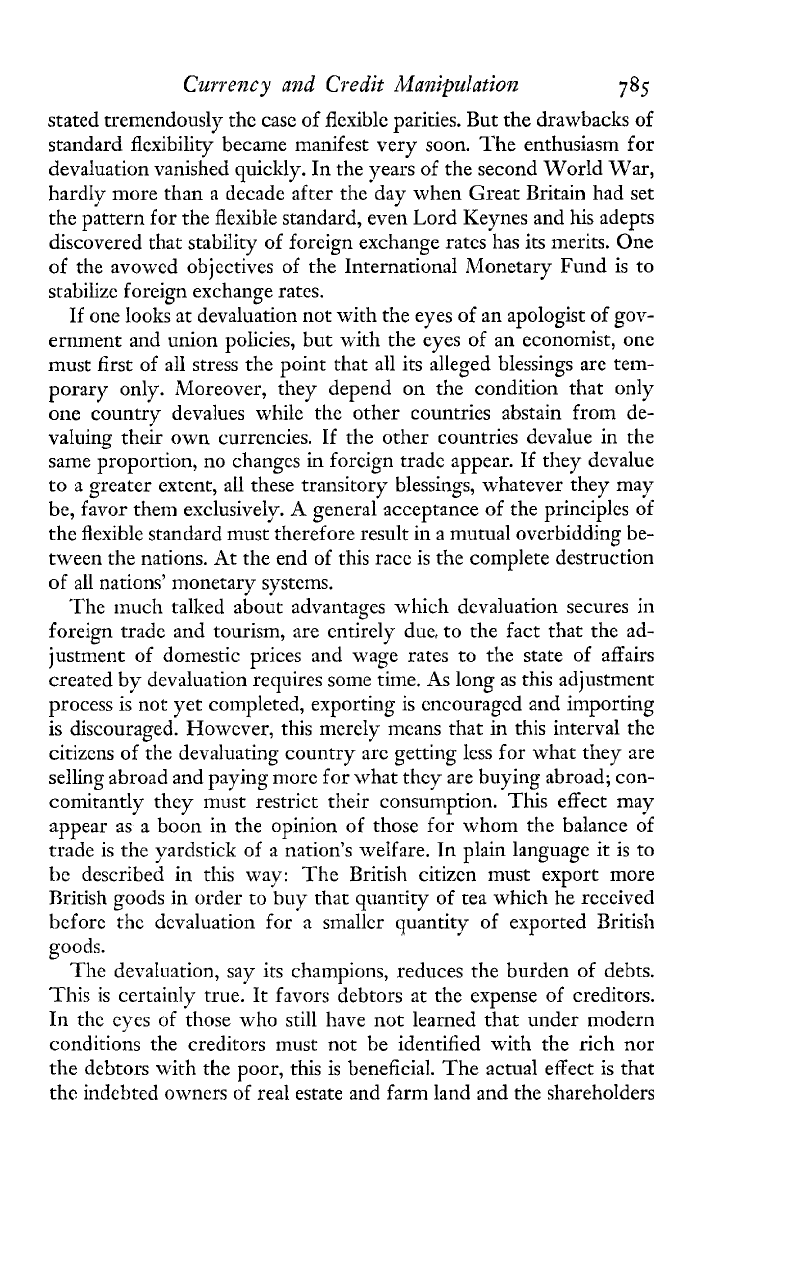
Currency and
Credit
itlanipulation
785
stated tremendously the case of flexible parities. But the drawbacks of
standard flexibility became manifest very soon. The enthusiasm for
devaluation vanished quickly. In the years of the second World War,
hardly more than a decade after theeday when Great Britain had set
the pattern for the flexible standard, even Lord Keynes and his adepts
discovered that stability of foreign exchange rates has its merits. One
of the avowed objectives of the International Monetary Fund is to
stabilize foreign exchange rates.
If one looks at devaluation not with the eyes of an apologist of gov-
ernment and union policies, but with the eyes of an economist, one
must first of all stress the point that all its alleged bIessings arc tern-
porary only. Moreover, they depend on the condition that only
one country devalues while the other countries abstain from de-
vaIuing their own currencies. If the other countries devalue in the
same proportion, no changes in foreign tradc appear. If they devalue
to
a
greater extent, all these transitory blessings, whatever they may
be, favor them exclusively.
A
general acceptance
of
the principles of
the flexible standard must therefore result in a mutual overbidding be-
tween the nations. At the end of this race is the complete destruction
of all nations' monetary systems.
'The much talked about advantages which devaluation secures in
foreign trade and tourism, are entirely due, to the fact that the ad-
justment of domestic prices and wage rates to the state of affairs
created by devaluation requires some time. As long as this adjustment
process is not yet completed, exporting is encouraged and importing
is discouraged. However, this nierely means that in this interval the
citizens of the devaluating country arc getting less for what they are
selling abroad and paying more for what they are buying abroad; con-
comitantly they must restrict their consumption. This effect may
appear as a boon in the opinion of those for whom the balance of
tradc is the yardstick of a nation's welfare. In plain language it is to
be described in this way: The British citizen must export more
Eritish goods in order to
buy
that quantity of tea which he received
before the devaluation for a smaller quantity of exported British
goods.
Thc devaluation, say its champions, reduces the burden of debts.
This is certainly true. It favors debtors at the expense of creditors.
In the eyes of those who still have not learned that under modern
conditions the creditors must not be identified with the rich nor
the debtors with the poor, this is beneficial. The actual effect is that
thc indebted owners of real estate and farm land and the shareholders
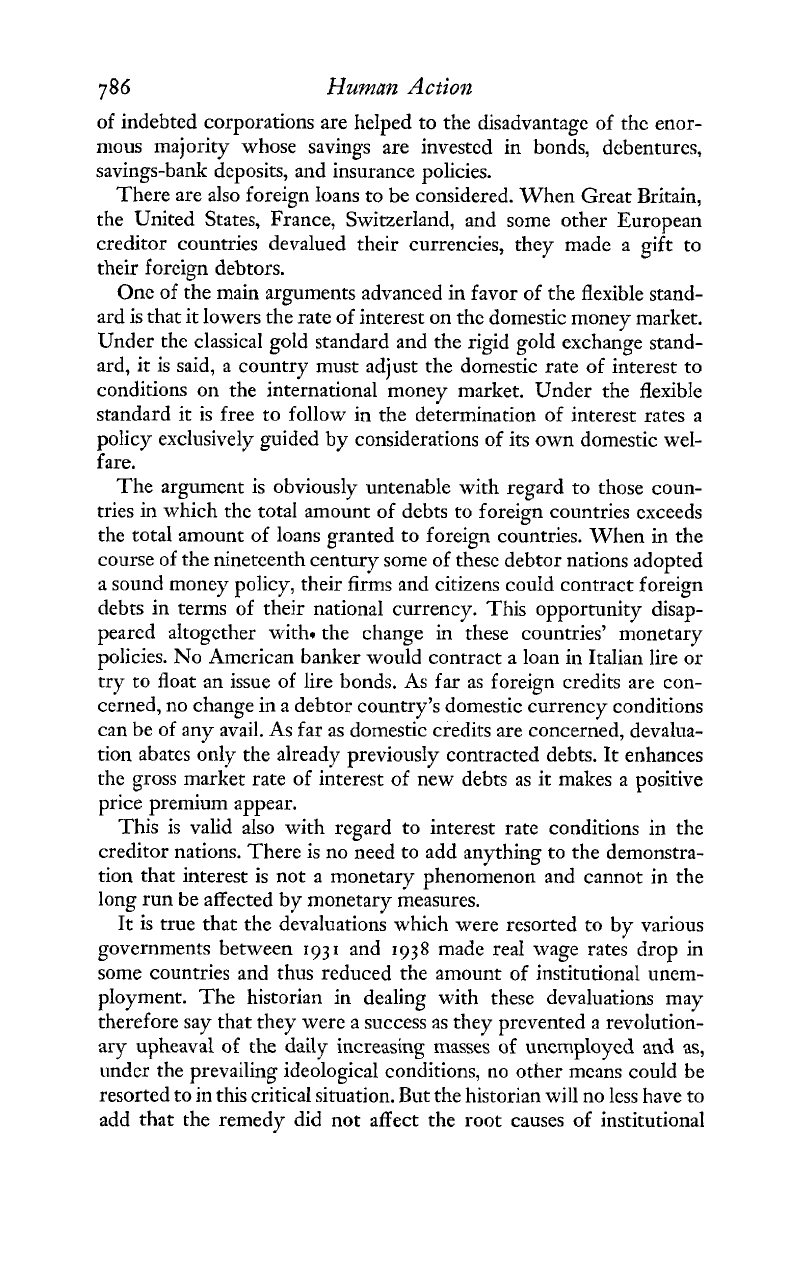
786
Human
Action
of indebted corporations are helped to the disadvantage of the enor-
mous majority whose savings are invested in bonds, debentures,
savings-bank deposits, and insurance policies.
There are also foreign loans to be considered. When Great Britain,
the United States, France, Switzerland, and some other European
crediror countries devalued their currencies, they made a gift to
their foreign debtors.
One of the main arguments advanced in favor of the flexible stand-
ard is that it lowers the rate of interest on the domestic money market.
Under the classical gold standard and the rigid gold exchange stand-
ard, it is said, a country must adjust the domestic rate of interest to
conditions on the international money market. Under the flexible
standard it is free to follow in the determination of interest rates a
policy exclusively guided by considerations of its own domestic wel-
fare.
The argument is obviously untenable with regard to those coun-
tries in which the total amount of debts to foreign countries exceeds
the total amount of loans granted to foreign countries. When in the
course of the nineteenth century some of these debtor nations adopted
a sound money policy, their firms and citizens couId contract foreign
debts in terms of their national currency. This opportunity disap-
peared altogether with. the change in these countries' monetary
policies. No American banker would contract a loan in Italian lire or
try to float an issue of lire bonds. As far as foreign credits are con-
cerned, no change in a debtor country's domestic currency conditions
can be of any avail. As far as domestic credits are concerned, devalua-
tion abates only the already previously contracted debts. It enhances
the gross market rate of interest of new debts as it makes a positive
price premium appear.
This is valid also with regard to interest rate conditions in the
creditor nations. There is no need to add anything to the demonstra-
tion that interest is not a monetary phenomenon and cannot in the
long run be affected
by
monetary measures.
It is true that the devaluations which were resorted
to
by various
governments between
1931
and
1938
made reaI wage rates drop in
some countries and thus reduced the amount of institutional unem-
ployment. The historian in dealing with these devaluations may
therefore say that they were a success as they prevented a revolution-
ary upheaval of the daily increasing masses
of
unemployed
and as,
under the prevailing ideological conditions, no other means could be
resorted to in this critical situation. But the historian will no less have to
add that the remedy did not affect the root causes of institutional
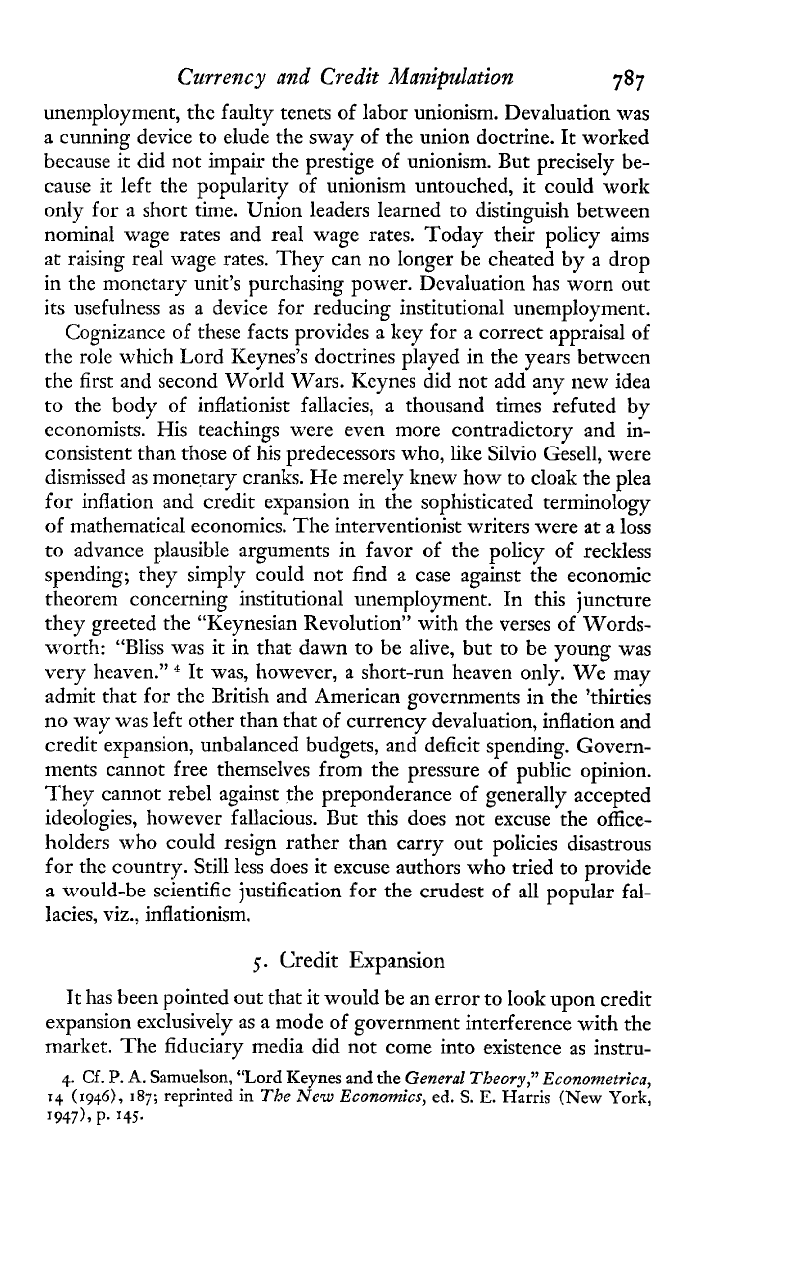
Currency and Credit Manipulation
unemployment, the faulty tenets of labor unionism. Devaluation was
a
cunning device to elude the sway of the union doctrine. It worked
because it did not impair the prestige of unionism. But precisely be-
cause it left the popularity of unionism untouched, it could work
only for a short time. Union leaders learned to distinguish between
nominal wage rates and real wage rates. Today their policy aims
at raising real wage rates. They can no longer be cheated by a drop
in the monetary unit's purchasing power. Devaluation has worn out
its usefulness as a device for reducing institutional uncmployment.
Cognizance of these facts provides a key for a correct appraisal of
the role which Lord Keynes's doctrines played in the years betwccn
the first and second World Wars. Keynes did not add any new idea
to the body of inflationist fallacies, a thousand times refuted by
economists. His teachings were even more contradictory and in-
consistent than those of his predecessors who, like Silvio Gesell, were
dismissed as monetary cranks.
He
merely knew how to cloak the plea
for inflation and credit expansion in the sophisticated terminology
of mathematical economics. The interventionist writers were at a loss
to advance plausible arguments in favor of the policy of reckless
spending; they simply could not find a case against the economic
theorem concerning institutional unemployment. In this juncture
they greeted the "Keynesian Revolution'' with the verses of Words-
worth: "Bliss was it in that dawn to be alive, but to be young was
very heaven."
'
It was, howevcr, a short-run heaven only. We may
admit that for the British and American governments in the 'thirties
no way was left other than that of currency devaluation, inflation and
credit expansion, unbalanced budgets, and deficit spending. Govern-
ments cannot free themselves from the pressure of public opinion.
They cannot rebel against the preponderance of generally accepted
ideologies, howevcr fallacious. But this does not excuse the office-
holders who could resign rather than carry out policies disastrous
for the country. Still less does it excuse authors who tried to provide
2
%rGn!d-be
sciendfic
jfisgfiC2tiGr?
fnr
the
af
~11
a-
nrrnnlor
r"rusaL
fol-
tax-
lacies, viz., inflationism.
5.
Credit Expansion
It has been pointed out that it would be an error to look upon credit
expansion exclusively as a mode of government interference with the
market. The fiduciary media did not come into existence as instru-
4.
Cf.
P.
A.
Samuelson,
"Lord
Keynes and the
General Theory,"
Econometrics,
74
(1946),
187;
reprinted in
The
New
Economics,
ed. S.
E.
Harris
(New
York,
1947).
p.
745.
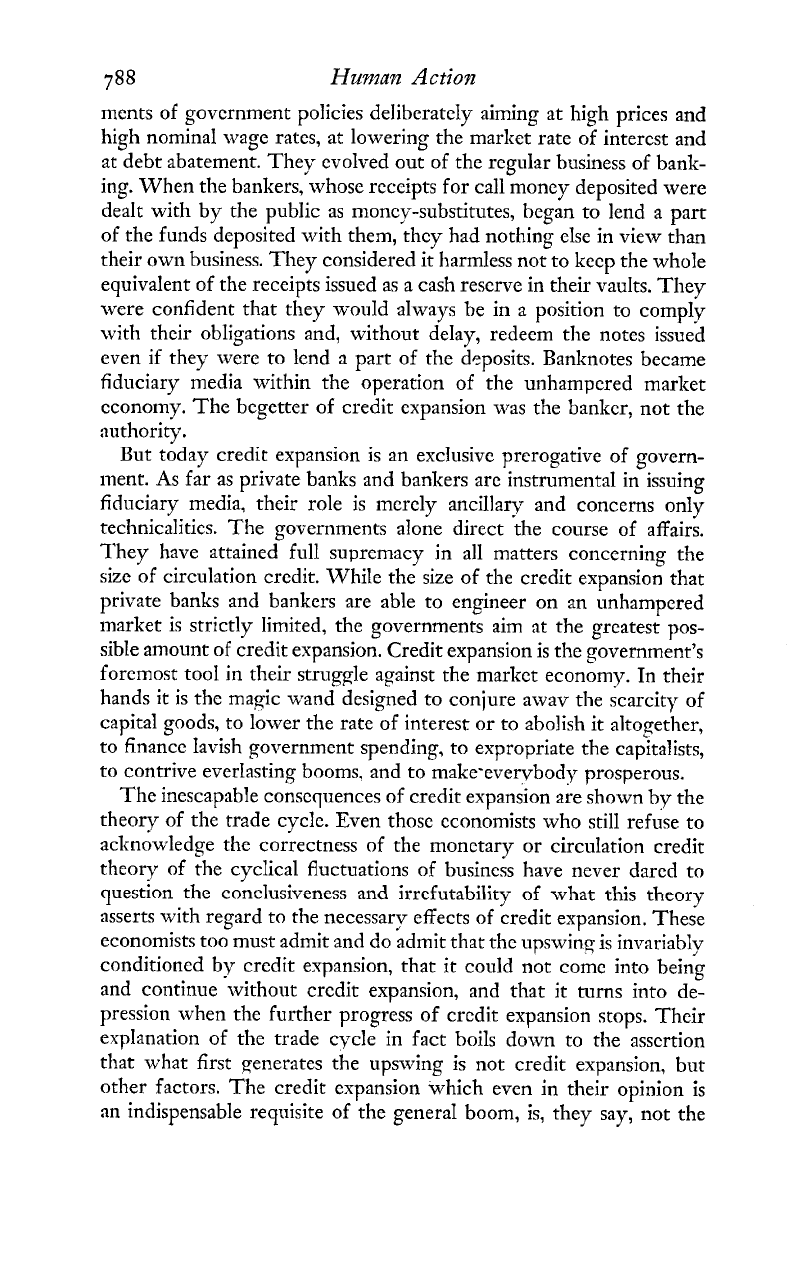
788
Human
Action
ments of govcrnment policies deliberately aiming at high prices and
high nominal wage rates, at lowering the market rate of intercst and
at debt abatement. They evolved out of the regular business of bank-
ing. When the bankers, whose receipts for call money deposited were
dealt with by the pubIic as money-substitutes, began to lend a part
of the funds deposited with them, they had nothing else in view than
their own business. They considered it harmless not to keep the whole
equivalent of the receipts issued as a cash reserve in their vaults. They
were confident that they would always be in a position to comply
with their obligations and, without delay, redeem the notes issued
even if they mere to lcnd a part of the d~posits. Banknotes became
fiduciary media within the operation of the unhampered market
cconorny. The begetter of credit expansion was the banker, not the
authority.
But today credit expansion is an exclusive prerogative of govern-
ment. As
far
as private banks and bankers are instrumental in issuing
fidnciary media, their role is mcrely ancillary and concerns only
technicalities. The governments alone direct the course of affairs.
They have attained full supremacy in all matters concerning the
size of circulation credit. While the size of the credit expansion that
private banks and bankers are able to engineer on an unhampered
market is strictly limited, the governments aim at the greatest pos-
sible amount of credit expansion. Credit expansion is the government's
foremost tool in their struggle against the market economy. In their
hands it is the magic wand designed to conjure awav the scarcity of
capital goods, to lower the rate of interest or to abolish it altogether,
to finance lavish government spending, to expropriate the capitalists,
to contrive everIasting booms. and to make-evervbody prosperous.
The inescapable consequences of credit expansion are shown
by
the
theory of the trade cycle. Even those economists who still refuse to
acknowledge the correctness of the monetary or circulation credit
theory of the cyclical fluctuations of business have never dared to
cneaio::
1
he
concl~siveness
and
Irrcfutabiliw
of
what
this theory
asserts with regard to the necessary effects of credit expansion. These
economists too must admit and do admit that the upswing is invariably
conditioned by credit expansion, that it could not come into being
and continue -without credit expansion, and that it turns into de-
pression when the further progress of credit expansion stops. Their
explanation of the trade cycle in fact boils down to the assertion
that what first generates the upswing is not credit expansion, but
other factors. The credit expansion which even in their opinion is
an indispensable requisite of the general boom, is, they say, not the
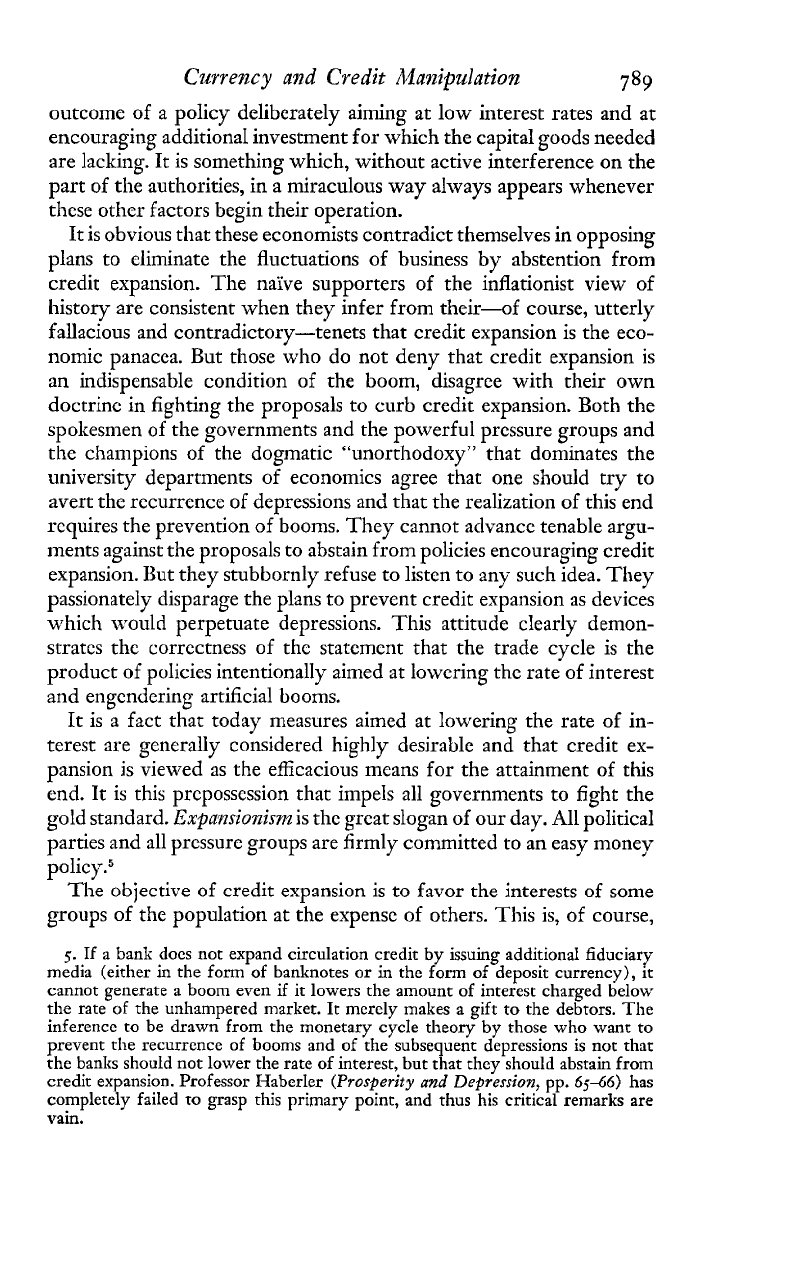
Currency and Credit Adanipulation
outcome of a policy deliberately aiming at low interest rates and at
encouraging additiona1 investment for which the capital goods needed
are lacking. It is something which, without active interference on the
part of the authorities, in a miraculous way always appears whenever
these other factors begin their operation.
It is obvious that these economists contradict themselves in opposing
plans to eliminate the fluctuations of business by abstention from
credit expansion. The na'ive supporters of the inflationist view of
history are consistent when they infer from their--of course, utterly
fallacious and contradictory-tenets that credit expansion is the eco-
nomic panacea. But those who do not deny that credit expansion is
an indispensable condition of the boom, disagree with their own
doctrinc in fighting the proposals to curb credit expansion. Both the
spokesn~en of the governments and the powerful pressure groups and
the champions of the dogmatic "unorthodoxy" that dominates the
university departments of economics agree that one should try to
avert the recurrcnce of depressions and that the realization of this end
requires the prevention of booms. They cannot advance tenable argu-
ments against the proposals to abstain from policies encouraging credit
expansion. But they stubbornly refuse to listen to any such idea. They
passionately disparage the plans to prevent credit expansion as devices
which would perpetuate depressions. This attitude clearly demon-
stratcs the correctness of the statcmcnt that the trade cycle is the
product of policies intentionally aimed at lowering the rate of interest
and engendering artificial booms.
It is a fact that today measures aimed at lowering the rate of in-
terest are gcnerally considered highly desirable and that credit ex-
pansion is viewed as the efficacious means for the attainment of this
end. It is this prcpossession that impels all governments to fight the
gold standard.
Expamionism
is the great slogan of our day. All political
parties and all pressure groups are firmly committed to an easy money
p01icy.~
The
nhi~rtirr~
Of
exp2nsiGfi is
m
fa~.rCr
the interests
ef
seFse
--I----'-
groups of the population at the expense of others. This is, of course,
5.
If a bank does not expand circulation credit by issuing additional fiduciary
media (either in the form of banknotes or
in
the form of deposit currency), it
cannot generate a boom even if it lowers the amount of interest charged below
the rate of the unhampered market. It merely makes a gift
to
the debtors. The
inference to be drawn from the monetary cycle theory by those who want to
prevent the recurrence of booms and of the subsequent depressions is not that
the banks should not lower the rate of interest, but that they should abstain from
credit expansion. Professor Haberler
(Prosperity and Depression,
pp.
65-66)
has
completely failed to grasp this primary point, and thus his critical remarks are
vain.
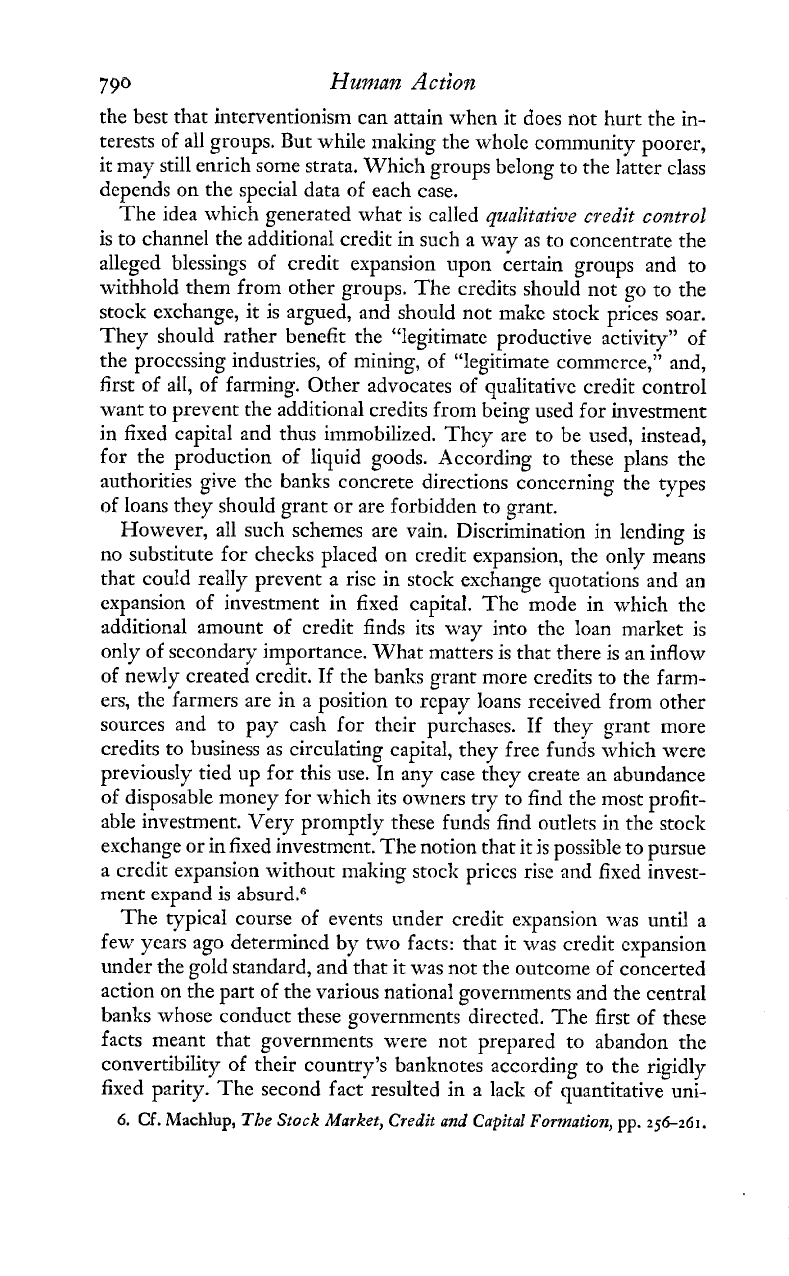
790
Human
Action
the best that interventionism can attain when it does not hurt the in-
terests of all groups. But while malting the whole community poorer,
it may still enrich some strata. Which groups belong to the latter class
depends on the special data of each case.
The idea which generated what is called
qualitative
credit
control
is to channel the additiona1 credit in such a way as to concentrate the
alleged blessings of credit expansion upon certain groups and to
withhold them from other groups. The credits should not go to the
stock exchange, it is argued, and should not make stock prices soar.
They should rather benefit the "legitimate productive activity" of
the processing industries, of mining, of LLlegitimate commerce," and,
first of all, of farming. Other advocates of qualitative credit control
want to prevent the additional credits from being used for investment
in fixed capital and thus immobilized. They are to be used, instead,
for the production of liquid goods. According to these plans thc
authorities give the banks concrete directions concerning the types
of loans they should grant or are forbidden to grant.
However, all such schemes are vain. Discrimination in lending is
no substitute for checks placed on credit expansion, the only means
that could really prevent a rise in stock exchange quotations and an
expansion of investment in fixed capital. Thc mode in which the
additional amount of credit finds its way into the loan market is
only of secondary importance. What matters is that there is an inflow
of newly created credit. If the banks grant more credits to the farm-
ers, the farmers are in a position to repay loans received from other
sources and to pay cash for their purchases.
If
they grant more
credits to business as circulating capital, they free funds which were
previously tied up for this use. In any case they create an abundance
of disposable money for which its owners try to find the most profit-
able investment. Very promptly these funds find outlets in the stock
exchange or in fixed investment. The notion that it is possible to pursue
a credit expansion without making stock prices rise and fixcd invest-
meat
ex
auu
13
au3uld.'
I?---'
:-
-"----
The typical course of events under credit expansion was until a
few years ago determined by two facts: that it was credit expansion
under the gold standard, and that it was not the outcome of concerted
action on the part of the various national governments and the central
banks whose conduct these governments directed. The first of these
facts meant that governments were not prepared to abandon the
convertibility of their country's banknotes according to the rigidly
fixed parity. The second fact resulted in a lack of quantitative uni-
6.
Cf.
Machlup,
The
Stock Market, Credit and Capital Formation,
pp.
256261.
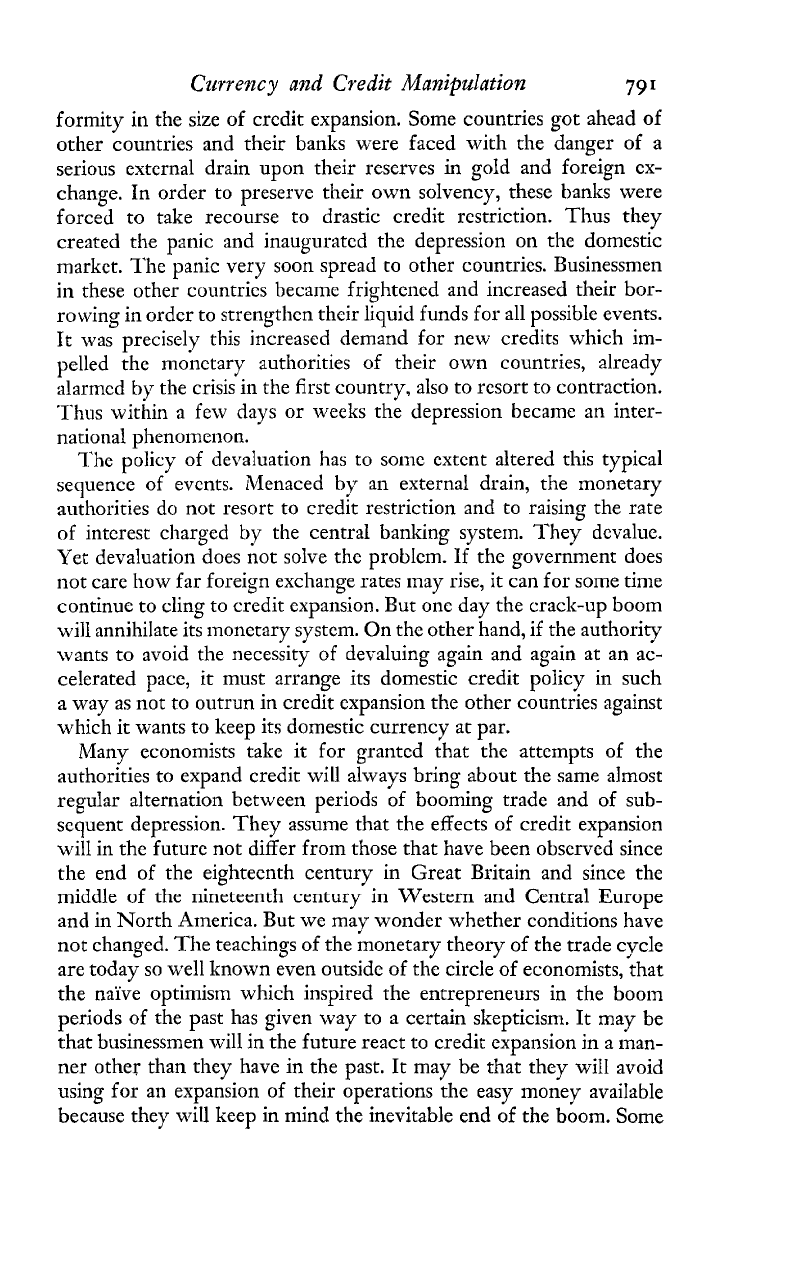
Czirrelzcy
and Credit Manipulation
791
formity in the size of credit expansion. Some countries got ahead of
other countries and their banks were faced with the danger of a
serious external drain upon their reserves in goId and foreign cx-
change. In order to preserve their own solvency, these banks were
forced to take recourse to drastic credit restriction. Thus they
created the panic and inaugurated the depression on the domestic
market. The panic very soon spread to other countries. Businessnlen
in these other countries became frightened and increased their bor-
rowing in order to strengthen their liquid funds for all possible evenrs.
Tt
was precisely this increased demand for new credits which im-
pelled the monetary authorities of their own countries, alrcady
alarmed
by
the crisis in the first country, also to resort to contraction.
'Shus within a few days or weeks the depression became an inter-
national phenomenon.
The policy of devaluation has to some cxtcnt altered this typical
sequence of events. Menaced by an external drain, the monetary
authorities do not resort to credit restriction and to raising the rate
of intcrest charged by the central banking system. They devalue.
Yet devaluation does not solve the problem. If the government does
not care how far foreign exchange rates may rise, it can for some time
continue to cling to credit expansion. But one day the crack-up boom
will annihilate its monetary system.
On
the other hand, if the authority
wants to avoid the necessity of devaluing again and again at an ac-
celerated pace, it must arrange its domestic credit policy in such
a way as not to outrun in credit expansion the other countries against
which it wants to keep its domestic currency at par.
Many economists take it for granted that the attempts of the
authorities to expand credit will always bring about the same almost
regular alternation between periods of booming trade and of sub-
sequent depression. They assume that the effects of credit expansion
will in the future not differ from those that have been observed since
the end of the eighteenth century in Great Britain and since the
middle
of
the nineteenth century
in
\Vestern and Central Europe
and in North America. But wc may wonder whether conditions have
not changed. The teachings of the monetary theory of the trade cycle
are today so well known even outside of the circle of economists, that
the nai've optimism which inspired the entrepreneurs in the boom
periods of the past has given way to a certain skepticism. It may be
that businessmen will in the future react to credit expansion in a man-
ner other than they have in the past. It may be that they will avoid
using for an expansion of their operations the easy money available
because they v17iIl keep in mind the inevitable end of the boom. Some
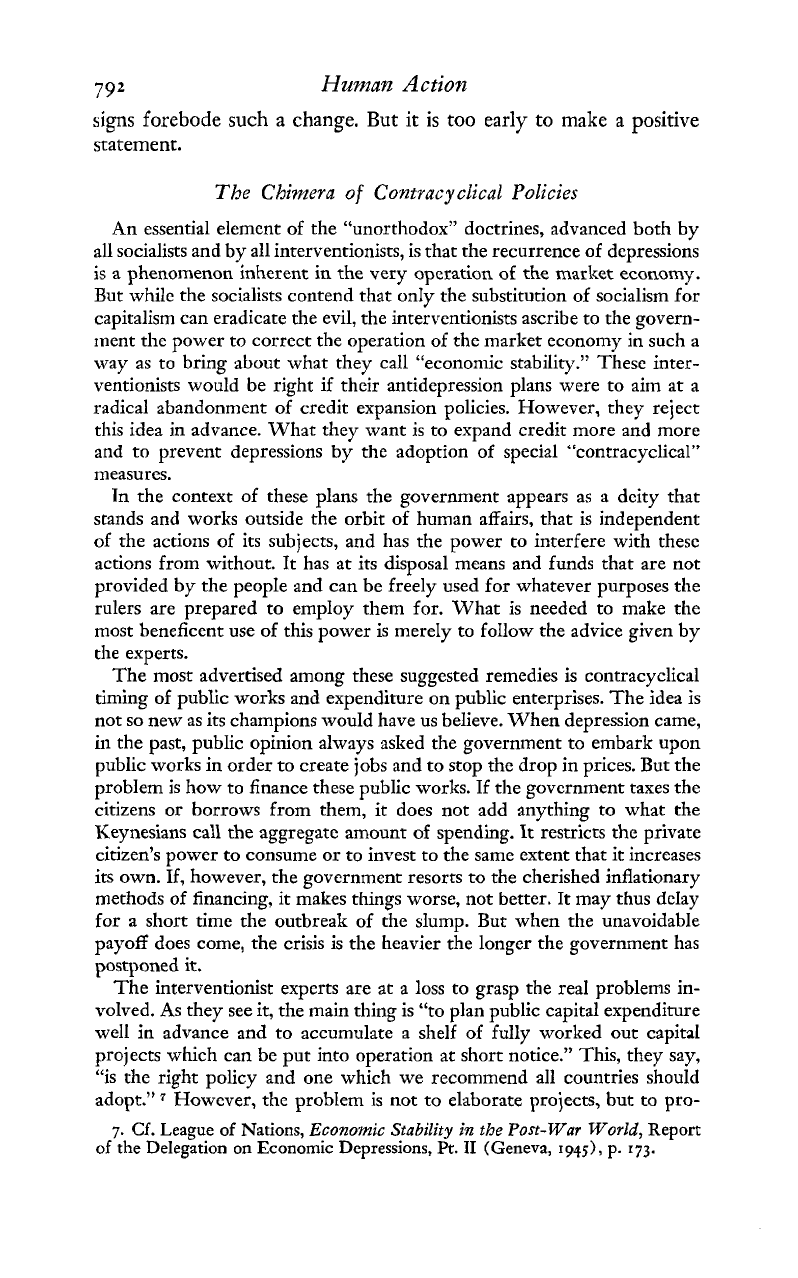
792
Human
Action
signs forebode such a change. But it is too early to make a positive
statement.
The Chimera
of
Contracyclical
Policies
An essential element of the "unorthodox" doctrines, advanced both by
all socialists and by all interventionists, is that the recurrence of depressions
is
a phenomenon inherent in the very operation of the market economy.
But while the socialists contend that only the substitution of socialism for
capitalism can eradicate the evil, the interventionists ascribe to the govern-
ment the power to correct the operation of the market economy in such a
way as to bring about what they call "econon~ic stability." These inter-
ventionists would be right if their antidepression plans were to aim at a
radical abandonment of credit expansion policies. However, they reject
this idea in advance. What they want is to expand credit more and more
and to prevent depressions by the adoption of special "contracyclical"
measures.
In the context of these plans the government appears as a deity that
stands and works outside the orbit of human affairs, that is independent
of the actions of its subjects, and has the power to interfere with these
actions from without. It has at its disposal means and funds that are not
provided by the people and can be freely used for whatever purposes the
rulers are prepared to employ them for. What is needed to make the
most beneficent use of this power is mereIy to foIlow the advice given by
the experts.
The most advertised among these suggested remedies
is
contracyclical
timing of public works and expenditure on public enterprises. The idea is
not so new as its champions would have us believe. When depression came,
in the past, public opinion always asked the government to embark upon
public works in order to create jobs and to stop the drop in prices. But the
problem is how to finance these public works. If the government taxes the
citizens or borrows from them, it does not add anything to what the
Keynesians call the aggregate amount of spending.
It
restricts the private
citizen's power to consume or to invest to the same extent that it increases
its own. If, however, the government resorts to the cherished inflationary
methods of financing, it makes things worse, not better.
It
may thus delay
for a short time the outbreak of the slump. But when the unavoidable
payoff does come, the crisis is the heavier the longer the government has
postponed it.
The interventionist experts are at a loss to grasp the real problems in-
volved. As they see it, the main thing is "to plan public capital expenditure
well in advance and to accumulate a shelf of fully worked out capital
projects which can be put into operation at short notice." This, they say,
"is the right policy and one which we recommend all countries should
adopt." However, the problem is not to elaborate projects, but to pro-
7.
Cf.
League of Nations,
Economic
Stability
in
the
Post-War World, Report
of
the
Delegation on Economic Depressions,
PC.
I1
(Geneva,
1945)~
p.
173.
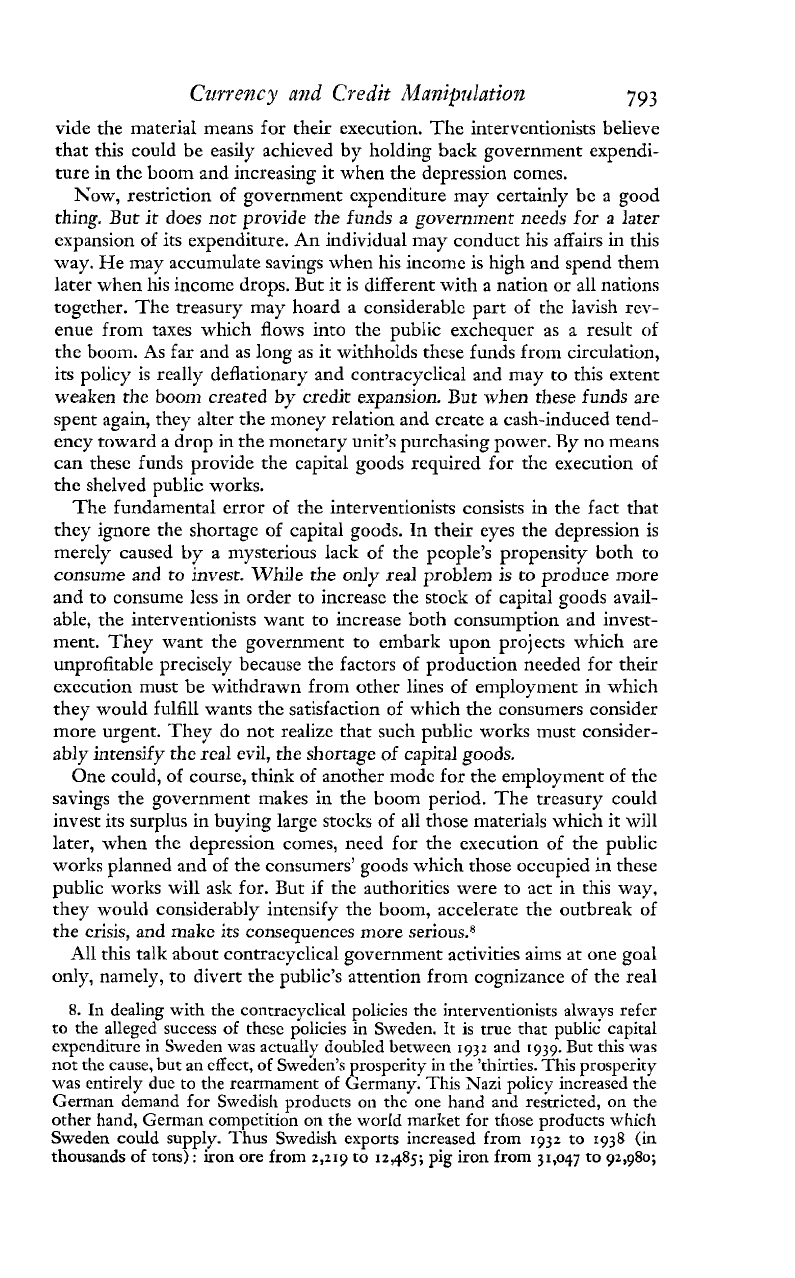
Czfrrency
and Credit i2laniplation
793
vide the materia1 means for their execution. The interventionists believe
that this could be easily achieved by holding back government expendi-
ture in the boom and increasing
it
when the depression comes.
Now, restriction of government expenditure may certainly be a good
thing. But it does not provide the funds a government needs for a later
expansion of its expenditure. An individual may conduct his affairs in this
way. He may accumulate savings when his income is high and spend them
later when his income drops. But it is different with
a
nation or all nations
together. The treasury may hoard a considerable part of the lavish rev-
enue from taxes which flows into the public exchequer as a result of
the boom. As far and as long as it withholds these funds from circulation,
its policy is really deflationary and contracyclical and may to this extent
weaken the boon] created by credit expansion.
But
when these funds are
spent again, they alter the money relation and crcate a cash-induced tend-
ency toward a drop in the monetary unit's purchasing power. By no means
can these funds provide the capital goods required for the execution of
the shelved public works.
The fundamental error of the interventionists consists in the fact that
they ignore the shortage of capital goods. In their eyes the depression is
merely caused by a mysterious lack of the people's propensity both to
consume and to invest. While the only real problem is to produce more
and to consume less in order to increase the stock of capital goods avail-
able, the interventionists want to increase both consumption and invest-
ment. They want the government to embark upon projects which are
unprofitable precisely because the factors of production needed for their
execution must be withdrawn from other lines of employment in which
they would fulfill wants the satisfaction of which the consumers consider
more urgent. They do not realize that such public works must consider-
ably intensify the real evil, the shortage of capital goods.
One could, of course, think of another
node
for the employment of the
savings the government makes in the boom period. The treasury could
invest its surplus in buying large stocks of all those materials which it will
later, when the depression comes, need for the execution of the public
works planned and of the consumers' goods which those occupied
in
these
public works will ask for. But if the authorities were to act in this way,
they would considerably intensify the boom, accelerate the outbreak of
the crisis, and make its consequences more serious."
-411 this talk about contracyclical government activities ai~ns at one goal
only, namely, to divert the public's attention from cognizance of the real
8.
In dealing with the contracyclical policies the interventionists always refer
to the alleged success of these policies in Sweden. It is true chat public capital
expenditure in Sweden was actually doubled between
1932
and
1939.
But this was
not the cause, but an effect, of Sweden's prosperity in the 'thirties.
This
prosperity
was entirely due to the rearmament of Germany. This Nazi policy increased the
German demand for Swedish products on the one hand and restricted, on the
other hand, German competition on the worId market for those products which
Sweden could supply. Thus Swedish exports increased from 1932 to 1938 (in
thousands of tons): iron ore from 2,219 to 12,485;
pig
iron from 31,047 to 92,980;
